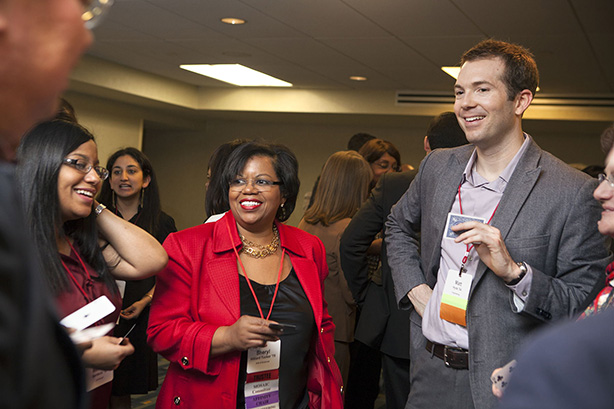END NOTE
Alumni: Essential champions of Cornell's diversity

Sheryl Tucker '78, center, alumni-elected Cornell trustee and chair of Cornell Mosaic, chats with participants at the 2013 Cornell Alumni Leadership Conference in Boston.
I knew I had landed somewhere special in August 1974, when I learned as an incoming freshman that Cornell University was built on a foundation of inclusion, diversity and innovative thinking about education. Although I didn't fully understand Ezra Cornell's "any person, any study" concept, I was delighted that he had created that big campus experience I craved: a university with lots of students from different backgrounds offering a broad array of classes. After all, I grew up in a small town in New Jersey with no more than three dozen students of color in my high school.
As a psychology major, I took many classes at the Africana Center and co-wrote my senior thesis on student social movements with my roommate, Charlene (Moore) Hayes. I served on the North Campus Union Board and worked on task forces to rethink student government and minority student services. Most importantly, I launched my journalism career as the editor-in-chief of Eclipse magazine and the newspaper Umoja Sasa (Unity Now), both dedicated to giving alternative thinkers a voice on campus.
We published just about anything reflecting the concerns and outrage of college students in the 1970s: students' rights, divestment from South Africa, bias incidents on campus, financial aid and tuition hikes & all mixed in with inexpensive recipes and poetry from lovesick students.
What I remember most was the support of Cornell administrators and professors. President Dale Corson permitted me to use his solar eclipse photography on the masthead of Eclipse, even though our tagline was "Eclipse: The darker side of the Sun." Vice President for Campus Affairs William D. Gurowitz '53 and President Frank H.T. Rhodes spent hours tutoring me on how universities operate so I could grill other administrators about campus policies. Professor Bill Cross' Africana Center classes exposed me to a very different black American experience than did my suburban childhood. My adviser, Professor Wade Boykin, taught me theories of motivation and why people do what they do.
Whether in class, in an office or marching in front of Willard Straight, I created my own version of today's "engaged learning."
Cornell certainly has evolved since 1978. But like many forward-thinking universities determined to graduate 21st-century global leaders and scholars, the struggle for diversity and inclusion continues. For Cornell, the quest is embedded in Ezra Cornell's dream of educating any student, which now includes high-achieving, underrepresented minority and economically disadvantaged young people. Equally important is that their experience on campus be enjoyable and productive. This requires a diverse mix of administrators and professors experienced in meeting the needs of all students.
I am encouraged by the commitment of President David Skorton and his senior administrators to make the campuswide Toward New Destinations initiative and the Office of Academic Diversity Initiatives successful. I also applaud the work of the Center for Intercultural Dialogue that is helping students celebrate the rich cultural mix on campus and unite across differences.
But despite good intentions, diversity and inclusion plans and programs without a convincing, embraced strategy and champions throughout campus will not achieve our goals.
Today I serve Cornell as an alumni-elected trustee and chair of Cornell Mosaic, whose mission is to engage and encourage diverse alumni to have a lifelong relationship with their alma mater.
Diverse alumni give their time, talent and treasure to make our university stronger by supporting campus initiatives. We provide a powerful network for our graduates and a sounding board for our administrators, faculty and staff. Above all, we contribute a creative, energizing and often unique perspective and spirit for all things Cornell.
Sheryl Hilliard Tucker '78 continued her passion for journalism as an award-winning editor-in-chief of three national publications (Black Enterprise, Your Company and Essence) and capped her media career as executive editor of Time Inc. Tucker is director of development and marketing at AFS Intercultural Programs Inc., an international organization that places more than 14,000 exchange students and 40,000 volunteers in 110 countries.